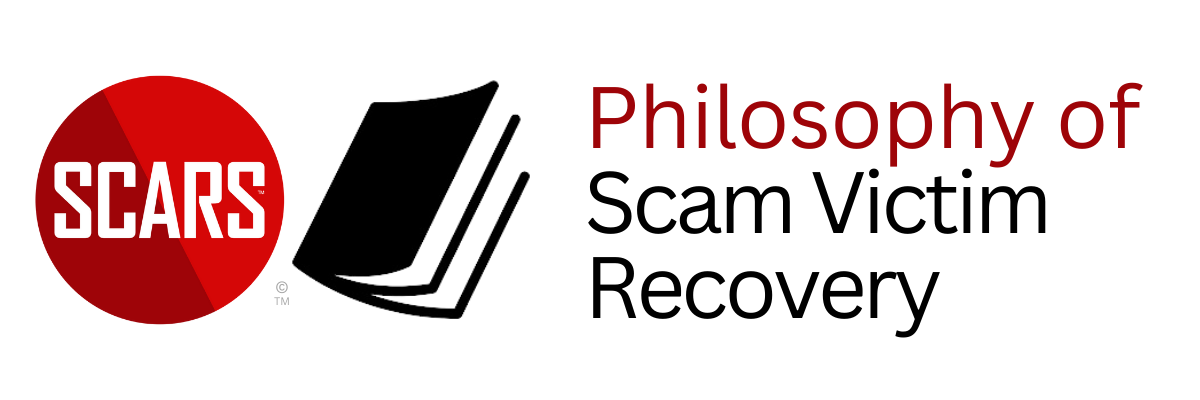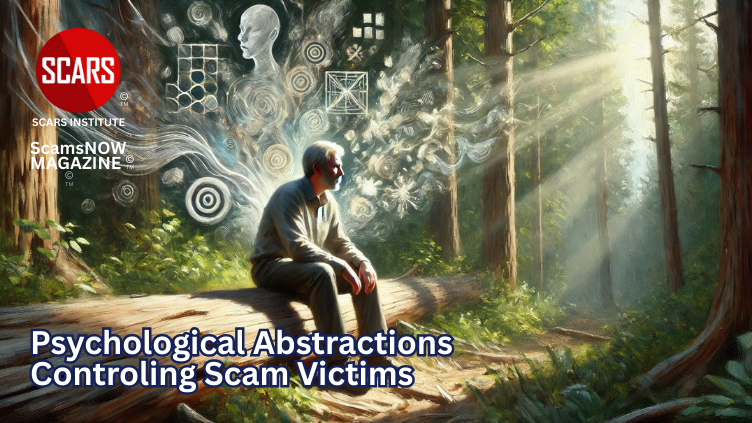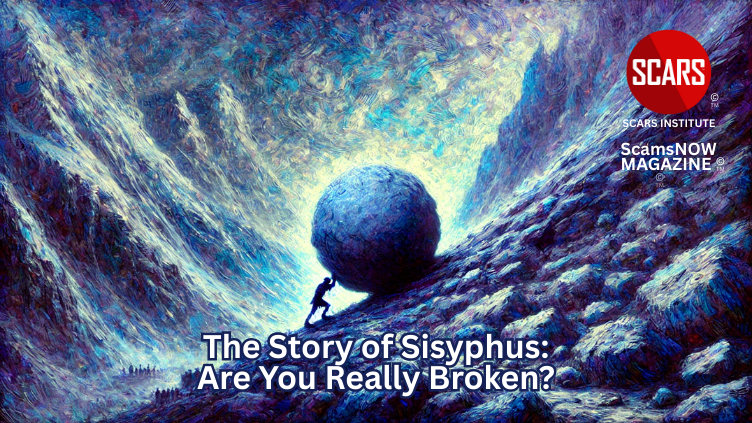The Story of Sisyphus: Are You Really Broken?
The Scam That Shattered Your Illusions, Not You – For Scam Victims
Primary Category: Scam Victim Recovery Philosophy
Intended Audience: Scam Victims-Survivors / Family & Friends / General Public / Others
Author:
• Tim McGuinness, Ph.D., DFin, MCPO, MAnth – Anthropologist, Scientist, Polymath, Director of the Society of Citizens Against Relationship Scams Inc.
About This Article
This article challenges the idea that scam victims are broken by their experience, arguing instead that what was truly destroyed was a set of comforting illusions—about trust, safety, and certainty—not the individual’s core identity. Drawing from the myth of Sisyphus, it compares the emotional aftermath of a scam to the futile labor of pushing shame and self-blame uphill every day. But unlike Sisyphus, scam victims are not doomed to repeat their pain forever.
The path to recovery involves acknowledging trauma without surrendering to it, grieving the loss of innocence without losing hope, and letting go of shame that never belonged to them in the first place. Being hurt does not mean being beyond repair. As long as victims continue to move forward, however slowly, they are healing.
As long as they commit to their recovery, they are rebuilding—not the person they were, but someone stronger, more aware, and more resilient. You are not broken. You are becoming someone who sees clearly, feels deeply, and survives honestly. And that is not a tragedy—it’s transformation.

The Story of Sisyphus: Are You Really Broken? The Scam That Shattered Your Illusions, Not You
Do you know the story of Sisyphus?
Greek mythology tells us he was condemned to an eternal, useless task—pushing a massive boulder up a hill only to have it roll back down every time he reached the top. Scam victims often feel the same way. Every day brings the weight of shame, confusion, grief, and self-blame. Just when they think they’ve made progress, something—a memory, a conversation, a new emotion—sends them back down the hill. The pain of being deceived doesn’t fade as quickly as anyone hopes. And often, behind that pain is a belief that you’ve been shattered by what happened. That the person you were has been destroyed. That your sense of self, your dignity, and your ability to trust are gone. But this belief—this quiet, persistent sense of brokenness—is not the truth. It’s part of the damage left behind by a lie.
- What if the scam didn’t break you at all?
- What if it only shattered an illusion?
Scammers don’t just steal money or time. They hijack your perception of the world. The scam itself is often built around things that feel very human and very natural: trust, love, hope, significance, connection. You weren’t tricked because you were weak. You were tricked because you were sincere. You believed in the reality you were shown. That’s not a flaw. It’s what people do when they’re healthy and open. The problem wasn’t your character. The problem was that someone else decided to exploit it.
For many people, the most disorienting part of scam recovery isn’t the financial loss or even the betrayal. It’s the collapse of a previously unshaken worldview. The belief that other people are basically good. That intentions matter. That love can’t be faked. That pain like this only happens to “other people.” That collapse can feel like identity death. But it’s not. It’s the painful end of a fantasy—a fantasy that may have quietly protected you for most of your life. That’s the real shattering. But what remains after the illusion is gone is something more honest, more aware, and ultimately more resilient.
In the early stages of recovery, it’s natural to want to get back to who you were before. You may long for the confidence, ease, and optimism you had before everything went sideways. But recovery doesn’t take you backwards. You don’t get to rebuild the same person. And in truth, you probably wouldn’t want to if you could. That person hadn’t yet seen what you’ve seen. They hadn’t learned what you now know. The version of yourself before the scam lived inside a set of untested assumptions. You don’t live there anymore. You can’t. But that doesn’t mean you’re broken. It means you’re being asked to build a new self—one with clearer vision, sharper instincts, and deeper self-awareness.
The hardest part of this process is what you’re still carrying. For most scam victims, that burden is shame. Shame tells you the lie was your fault. It whispers that you should have known better. It repeats old scripts: You were naive. You were desperate. You were too emotional. Shame builds a boulder that you try to push away, every day, hoping you’ll outrun it. But the truth is, you’ll never make progress while you’re still pushing shame uphill. That’s the trick. That’s what keeps the cycle going. You’re not healing—you’re exhausting yourself.
There is another way. You can choose to drop the boulder.
Shame is not proof of your failure. It’s a reflex created by trauma. And it doesn’t belong to you. It belongs to the liar who manipulated you. Carrying their lies around doesn’t give you closure. It just keeps the pain alive. You can put it down. You can say: I was targeted. I was deceived. But that doesn’t define who I am. That was something done to me—not a reflection of my worth.
Once you stop pushing the boulder, something changes. You start seeing yourself more clearly. You stop looking at what you lost, and start noticing what’s still there. The intelligence. The empathy. The ability to feel deeply. The strength it took to survive the worst emotional betrayal of your life. Those qualities were never destroyed. They were buried—under fear, under doubt, under heartbreak. Now they’re re-emerging. That process is what psychologists call post-traumatic growth. Not everyone talks about it, but it’s real. When your identity is shattered, you get a chance to rebuild—not from old assumptions, but from hard-earned truth.
You may discover that you are more aware of emotional manipulation than ever before. That you can spot insincerity where others miss it. That you listen to your gut instead of pushing it aside. That you set boundaries where you used to give the benefit of the doubt. You may even find that your capacity for love and connection is deeper now—not because it was never wounded, but because it survived. That’s not a sign of being broken. That’s resilience. That’s growth.
None of this means you won’t grieve. You will. The grief is real. You’re not just mourning money or time—you’re mourning the version of reality that felt safe. You’re mourning the idea that trust was simple. You’re mourning the fact that your story now includes something you never would have chosen. Grief is part of healing. It doesn’t mean you’re weak. It means you’re human.
But grief, like all emotions, moves. It evolves. One day it’s crushing. The next day, it’s quiet. Eventually, it becomes part of your story, not the whole thing. Over time, you find space in your life for things that aren’t grief. Laughter. Curiosity. Joy. Trust—not blind, but deliberate. Recovery doesn’t mean pretending nothing happened. It means integrating what happened so that you can live without constantly reliving it.
At some point in this process, you may look in the mirror and realize you’re not who you used to be. And that may scare you. But if you look closer, you’ll also see that you’re more than you were. More informed. More honest. More grounded. The scam didn’t destroy you. It stripped away the illusions that used to shelter you from the darker side of human behavior. Now that you see it, you’re no longer defenseless. You’re aware. That’s a form of power. That’s a kind of freedom.
You might remember the Japanese art of kintsugi—repairing broken pottery with gold, so the cracks become part of the beauty, not something to be hidden. The bowl isn’t restored to its original form. It becomes something else—something that carries its wounds openly, and is stronger for it. This is often used as a metaphor for healing, and while it’s easy to turn it into a cliché, in your case, it fits. You are someone who has been cracked by betrayal. But those cracks are not damage. They are proof that you survived something most people will never understand. You’re still here. And you’re not hiding the truth.
That might be the most radical part of recovery—telling the truth. Not just to others, but to yourself. The scam gave you something false. Your healing gives you something real. Real pain, yes. But also real insight. Real clarity. Real strength. The false story you were sold may be gone, but the person you’re becoming now is entirely yours.
In time, you may even let go of the fantasy. The connection you thought you had with the scammer, no matter how emotional or meaningful it felt, was not built on reality. It served a purpose—it met a need, gave you hope—but it wasn’t true. Letting go of that fantasy doesn’t mean denying that it mattered to you. It means recognizing that it doesn’t get to define your future. You can grieve it and still move forward. You can feel loss and still choose growth. You can love what the fantasy gave you while acknowledging that it was never real.
You don’t have to live like Sisyphus. You don’t have to spend the rest of your life pushing the same boulder uphill. You don’t have to perform your pain every day just to prove you were hurt. You don’t need to justify your grief or your healing. You’ve already been through enough.
Let go of the shame. Let go of the illusion. Let go of the need to “go back.”
You are not broken. You are simply becoming someone who no longer carries the weight of what wasn’t true.
And that’s not the end of your story. That’s the beginning.
Not Broken Doesn’t Mean Unharmed
When we say you are not broken, we are not saying you are untouched by what happened. Scam trauma is real. The psychological injury left behind is not imaginary or exaggerated—it is deep, often invisible, and sometimes debilitating. You may feel overwhelmed by waves of grief, guilt, rage, or confusion. You may experience physical symptoms, emotional exhaustion, or even a loss of identity. That is the nature of trauma. And healing from it takes real work.
But being traumatized is not the same as being broken.
Broken means you are beyond repair. It means there’s no coming back, that something essential in you has been permanently destroyed. And that is not true—not for you, not now, not ever. As long as you do not give up, as long as you stay committed to your recovery, as long as you believe—even a little—that your life can hold meaning again, you are not broken.
You may be hurt. You may be raw. You may be grieving. But you are still here. And that means you are still in motion. Recovery is not about snapping back. It’s about steadily rebuilding your emotional foundation, piece by piece, with clearer vision and stronger tools.
So when you hear you are not broken, don’t think it means your pain is dismissed. Think of it as a statement of defiance against the idea that this is the end of your story. You are allowed to be deeply wounded and still wholly intact as a person. The trauma is real. But it doesn’t get to define your limit.
Conclusion: You’ve Already Survived the Worst Part
What happened to you should never have happened. The betrayal, the lies, the manipulation—it all took something from you. But it did not take everything. It didn’t erase your identity. It didn’t eliminate your worth. It didn’t destroy your ability to heal. You may not feel that yet, but it’s true.
You’ve already done the hardest thing: you survived. You woke up the day after the truth came crashing down. You kept breathing through the confusion, the disbelief, the pain. You kept showing up to your life, even if you were only going through the motions. That is not failure. That is endurance. And endurance becomes recovery when you decide that you don’t want to live in the shadow of someone else’s lie anymore.
The scam was never proof that you were broken. It was proof that you were human—capable of love, trust, hope, and belief. Those are not flaws. They’re strengths. What matters now is how you use them moving forward. You don’t need to deny your pain to reclaim your future. You don’t need to erase the past to move beyond it. You are not required to “get over it” in anyone’s timeline but your own. What you are allowed to do—today, and every day that follows—is stop pushing the boulder.
The punishment of Sisyphus wasn’t the rock itself. It was the futility—the endless repetition, the illusion that effort alone would change his fate. But you are not condemned. You are not in a loop. You have a way out. Not by pretending you’re fine. Not by minimizing what happened. But by letting go of what isn’t true: that you’re worthless, that you’re beyond repair, that the best version of you was lost forever.
You were never broken. You were betrayed. And now, you’re rebuilding. Not from scratch, but from substance. From what is real. You have scars—but they are not disfigurements. They are markers of a fight that you didn’t choose, but refused to lose.
So take a breath. Step away from the hill. Drop the boulder. You’re not stuck in a myth. This is your life. And it’s not over. It’s just beginning—stronger, wiser, and entirely your own.
-/ 30 /-
What do you think about this?
Please share your thoughts in a comment below!
Statement About Victim Blaming
SCARS Institute articles examine different aspects of the scam victim experience, as well as those who may have been secondary victims. This work focuses on understanding victimization through the science of victimology, including common psychological and behavioral responses. The purpose is to help victims and survivors understand why these crimes occurred, reduce shame and self-blame, strengthen recovery programs and victim opportunities, and lower the risk of future victimization.
At times, these discussions may sound uncomfortable, overwhelming, or may be mistaken for blame. They are not. Scam victims are never blamed. Our goal is to explain the mechanisms of deception and the human responses that scammers exploit, and the processes that occur after the scam ends, so victims can better understand what happened to them and why it felt convincing at the time, and what the path looks like going forward.
Articles that address the psychology, neurology, physiology, and other characteristics of scams and the victim experience recognize that all people share cognitive and emotional traits that can be manipulated under the right conditions. These characteristics are not flaws. They are normal human functions that criminals deliberately exploit. Victims typically have little awareness of these mechanisms while a scam is unfolding and a very limited ability to control them. Awareness often comes only after the harm has occurred.
By explaining these processes, these articles help victims make sense of their experiences, understand common post-scam reactions, and identify ways to protect themselves moving forward. This knowledge supports recovery by replacing confusion and self-blame with clarity, context, and self-compassion.
Additional educational material on these topics is available at ScamPsychology.org – ScamsNOW.com and other SCARS Institute websites.
-/ 30 /-
What do you think about this?
Please share your thoughts in a comment below!
5 Comments
Leave A Comment
TABLE OF CONTENTS
CATEGORIES
![NavyLogo@4x-81[1] The Story of Sisyphus: Are You Really Broken? The Scam That Shattered Your Illusions, Not You - For Scam Victims - 2025](https://scamsnow.com/wp-content/uploads/2025/04/NavyLogo@4x-811.png)
ARTICLE META
Important Information for New Scam Victims
- Please visit www.ScamVictimsSupport.org – a SCARS Website for New Scam Victims & Sextortion Victims.
- SCARS Institute now offers its free, safe, and private Scam Survivor’s Support Community at www.SCARScommunity.org – this is not on a social media platform, it is our own safe & secure platform created by the SCARS Institute especially for scam victims & survivors.
- SCARS Institute now offers a free recovery learning program at www.SCARSeducation.org.
- Please visit www.ScamPsychology.org – to more fully understand the psychological concepts involved in scams and scam victim recovery.
If you are looking for local trauma counselors, please visit counseling.AgainstScams.org
If you need to speak with someone now, you can dial 988 or find phone numbers for crisis hotlines all around the world here: www.opencounseling.com/suicide-hotlines
Statement About Victim Blaming
Some of our articles discuss various aspects of victims. This is both about better understanding victims (the science of victimology) and their behaviors and psychology. This helps us to educate victims/survivors about why these crimes happened and not to blame themselves, better develop recovery programs, and help victims avoid scams in the future. At times, this may sound like blaming the victim, but it does not blame scam victims; we are simply explaining the hows and whys of the experience victims have.
These articles, about the Psychology of Scams or Victim Psychology – meaning that all humans have psychological or cognitive characteristics in common that can either be exploited or work against us – help us all to understand the unique challenges victims face before, during, and after scams, fraud, or cybercrimes. These sometimes talk about some of the vulnerabilities the scammers exploit. Victims rarely have control of them or are even aware of them, until something like a scam happens, and then they can learn how their mind works and how to overcome these mechanisms.
Articles like these help victims and others understand these processes and how to help prevent them from being exploited again or to help them recover more easily by understanding their post-scam behaviors. Learn more about the Psychology of Scams at www.ScamPsychology.org
SCARS INSTITUTE RESOURCES:
If You Have Been Victimized By A Scam Or Cybercrime
♦ If you are a victim of scams, go to www.ScamVictimsSupport.org for real knowledge and help
♦ SCARS Institute now offers its free, safe, and private Scam Survivor’s Support Community at www.SCARScommunity.org/register – this is not on a social media platform, it is our own safe & secure platform created by the SCARS Institute especially for scam victims & survivors.
♦ Enroll in SCARS Scam Survivor’s School now at www.SCARSeducation.org
♦ To report criminals, visit https://reporting.AgainstScams.org – we will NEVER give your data to money recovery companies like some do!
♦ Follow us and find our podcasts, webinars, and helpful videos on YouTube: https://www.youtube.com/@RomancescamsNowcom
♦ Learn about the Psychology of Scams at www.ScamPsychology.org
♦ Dig deeper into the reality of scams, fraud, and cybercrime at www.ScamsNOW.com and www.RomanceScamsNOW.com
♦ Scam Survivor’s Stories: www.ScamSurvivorStories.org
♦ For Scam Victim Advocates visit www.ScamVictimsAdvocates.org
♦ See more scammer photos on www.ScammerPhotos.com
You can also find the SCARS Institute’s knowledge and information on Facebook, Instagram, X, LinkedIn, and TruthSocial
Psychology Disclaimer:
All articles about psychology and the human brain on this website are for information & education only
The information provided in this and other SCARS articles are intended for educational and self-help purposes only and should not be construed as a substitute for professional therapy or counseling.
Note about Mindfulness: Mindfulness practices have the potential to create psychological distress for some individuals. Please consult a mental health professional or experienced meditation instructor for guidance should you encounter difficulties.
While any self-help techniques outlined herein may be beneficial for scam victims seeking to recover from their experience and move towards recovery, it is important to consult with a qualified mental health professional before initiating any course of action. Each individual’s experience and needs are unique, and what works for one person may not be suitable for another.
Additionally, any approach may not be appropriate for individuals with certain pre-existing mental health conditions or trauma histories. It is advisable to seek guidance from a licensed therapist or counselor who can provide personalized support, guidance, and treatment tailored to your specific needs.
If you are experiencing significant distress or emotional difficulties related to a scam or other traumatic event, please consult your doctor or mental health provider for appropriate care and support.
Also read our SCARS Institute Statement about Professional Care for Scam Victims – click here
If you are in crisis, feeling desperate, or in despair, please call 988 or your local crisis hotline – international numbers here.
More ScamsNOW.com Articles
A Question of Trust
At the SCARS Institute, we invite you to do your own research on the topics we speak about and publish. Our team investigates the subject being discussed, especially when it comes to understanding the scam victims-survivors’ experience. You can do Google searches, but in many cases, you will have to wade through scientific papers and studies. However, remember that biases and perspectives matter and influence the outcome. Regardless, we encourage you to explore these topics as thoroughly as you can for your own awareness.

























![scars-institute[1] The Story of Sisyphus: Are You Really Broken? The Scam That Shattered Your Illusions, Not You - For Scam Victims - 2025](https://scamsnow.com/wp-content/uploads/2025/04/scars-institute1.png)

![niprc1.png1_-150×1501-1[1] The Story of Sisyphus: Are You Really Broken? The Scam That Shattered Your Illusions, Not You - For Scam Victims - 2025](https://scamsnow.com/wp-content/uploads/2025/04/niprc1.png1_-150x1501-11.webp)
Thank you very much for this article.
I needed to read this tonight. It is a great reminder of how far I’ve come.
This is a must read every now and then.
Where are the photos of the female scammers you said you look at it you said you had posted I don’t see no pictures
Visit http://www.ScammerPhotos.com – mentioned several times on our site
Totalmente de acuerdo este articulo nos ayuda a entender que apesar de lo dificil que fue haber sido victima de estafa y de todos los daños que dejo, aun nos queda algo muy importante y de mucho valor que es nuestra vida, nuestra escencia y nuestra decision de ser mas que todo eso es negativo que vivimos… despues de la estafa yo siemrpe me repetia a mi misma ” el estafador robo mi dinero, no permitire que robe mi vida, ni el ni nadie merece que mi historia termine asi, yo puedo volver a escribir un nuevo futuro para mi y resurgir una vez mas.”
I know that I am not the same person I was before the scam. I miss living in a safe world–the allusion of a safe world I guess. But I know this article speaks the truth about coming away from this terrible exposure to the cruelties of scamming with a better insight on how the world really is. I don’t bury my head in the sand any more. I don’t trust as easily, and I DO use my head more than my heart to ascertain truth from error. Thank you for this post. I really loved it!